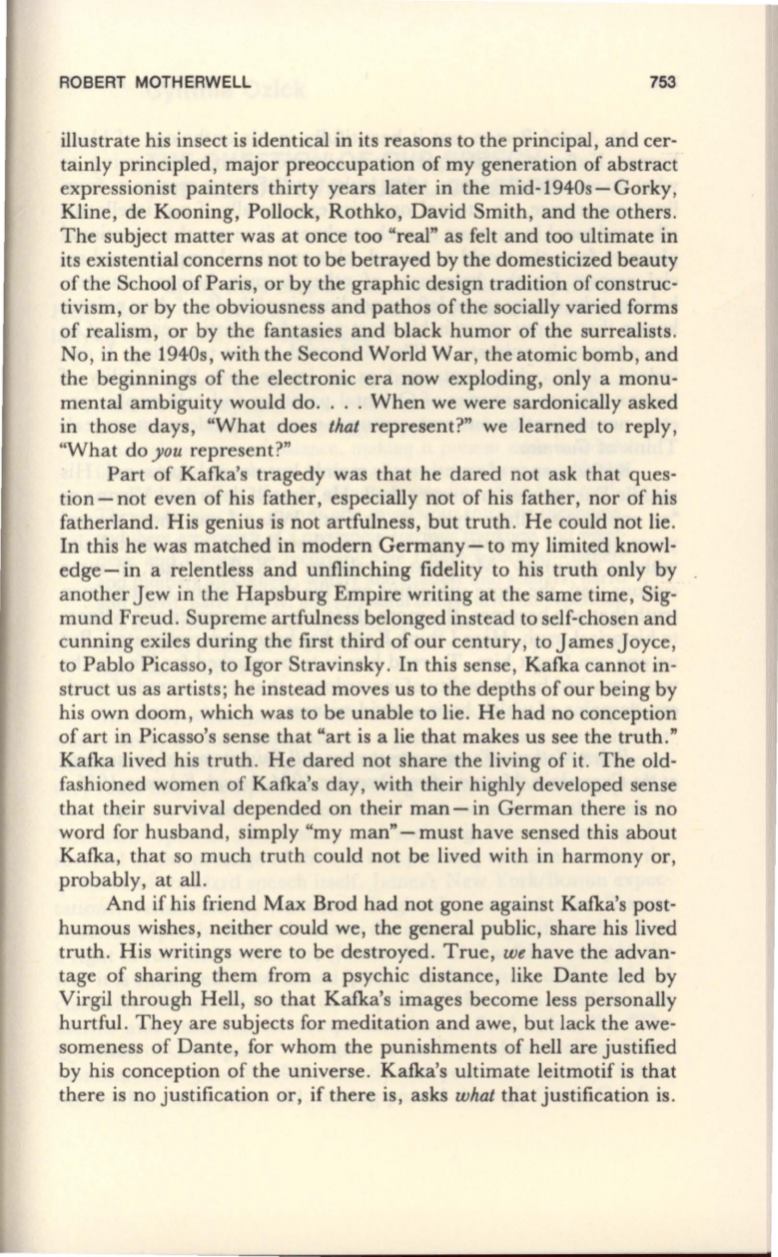
ROBERT MOTHERWELL
753
illustrate his insect is identical in its reasons to the principal, and cer–
tainly principled, major preoccupation of my generation of abstract
expressionist painters thirty years later in the mid-1940s- Gorky,
Kline, de Kooning, Pollock, Rothko, David Smith, and the others.
The subject matter was at once too "real" as felt and too ultimate in
its existential concerns not to be betrayed by the domesticized beauty
of the School of Paris, or by the graphic design tradition of construc–
tivism, or by the obviousness and pathos of the socially varied forms
of realism, or by the fantasies and black humor of the surrealists.
No, in the 1940s, with the Second World War, the atomic bomb, and
the beginnings of the electronic era now exploding, only a monu–
mental ambiguity would do.... When we were sardonically asked
in those days, "What does
that
represent?" we learned to reply,
"What do
you
represent?"
Part of Kafka's tragedy was that he dared not ask that ques–
tion- not even of his father, especially not of his father, nor of his
fatherland. His genius is not artfulness, but truth. He could not lie.
In this he was matched in modern Germany-to my limited knowl–
edge- in a relentless and unflinching fidelity to his truth only by
another Jew in the Hapsburg Empire writing at the same time, Sig–
mund Freud. Supreme artfulness belonged instead to self-chosen and
cunning exiles during the first third of our century, to James Joyce,
to Pablo Picasso, to Igor Stravinsky. In this sense, Kafka cannot in–
struct us as artists; he instead moves us to the depths of our being by
his own doom, which was to be unable to lie. He had no conception
of art in Picasso's sense that "art is a lie that makes us see the truth."
Kafka lived his truth. He dared not share the living of it. The old–
fashioned women of Kafka's day, with their highly developed sense
that their survival depended on their man- in German there is no
word for husband, simply "my man"- must have sensed this about
Kafka, that so much truth could not be lived with in harmony or,
probably, at all.
And if his friend Max Brad had not gone against Kafka's post–
humous wishes, neither could we, the general public, share his lived
truth. His writings were to be destroyed. True,
we
have the advan–
tage of sharing them from a psychic distance, like Dante led by
Virgil through Hell, so that Kafka's images become less personally
hurtful. They are subjects for meditation and awe, but lack the awe–
someness of Dante, for whom the punishments of hell are justified
by his conception of the universe. Kafka's ultimate leitmotif is that
there is no justification or, if there is, asks
what
that justification is.


